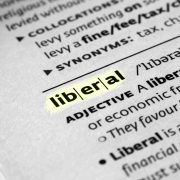“Liberal” and “capitalism” are not terms typically associated with each other today. This is largely because “liberal” is now so widely associated with progressivism, an ideology that espouses anti-capitalist beliefs.
Progressives falsely get the credit as being the philanthropists of the political world. And to many, capitalism appears to be the antithesis of humanitarianism, crushing the people and subjecting them to the whims of the wealthy and entrepreneur class. But in reality, capitalism is the ideology for all. And it has been one of the only real tools against global poverty and stagnation.
What Is Capitalism?
In the introduction of his book Liberalism, Mises refers to capitalism as follows:
“A society in which liberal principles are put into effect is usually called a capitalist society, and the condition of that society, capitalism.”
As discussed previously, Mises explains that true and classical liberalism encompasses free markets, cosmopolitanism, and limited government intervention. But above all things, capitalism has made the world a better place by allowing innovation of all kinds to improve the lives of individual beings.
Because of capitalism, countless jobs have been created that have helped improve the lives of many. Thanks to the scientific improvements that have come as a result of free market capitalism, people are living longer. Diseases that once wreaked havoc are now eradicated. Likewise, technological advances have made the world a more convenient place to live while also allowing larger quantities of products to be made at lower costs and at quicker speeds.
Capitalism has allowed wealth to be created while also creating abundant value in the lives of all those who reap the benefits of innovation: which is every single actor involved in the market process, both consumer and creator.
Mises reflects on this phenomenon by saying:
“However, it requires only a moment’s reflection to realize that the fruits of all technological and industrial innovations make for an improvement in the satisfaction of the wants of the great masses.”
But it isn’t only those who subscribe to Austrian economics who understand how free market capitalism enriches the lives all those it impacts.
The band U2’s frontman Bono has never been shy about flaunting his philanthropic work in developing nations. In his political life, he has been a huge advocate for progressive policies. However, in 2013 he admitted that during the course of his work he learned that it was not foreign aid that helped lift individuals out of poverty.
When reflecting on his work in Africa, Bono said:
“Aid is just a stopgap. Commerce [and] entrepreneurial capitalism take more people out of poverty than aid. We need Africa to become an economic powerhouse.”
Unfortunately, there are still many who, for one reason or another, refuse to see the situation clearly. Instead of associating capitalism with flourishing nations, they equate it only with suffering and wealth inequality.
As Mises says:
“Nevertheless, as a result of the zealous propaganda of the anti-liberal parties, which twists the facts the other way round, people today have come to associate the ideas of liberalism and capitalism with the image of a world plunged into ever increasing misery and poverty.”
Liberalism Is for Everyone
One of the most commonly heard arguments against liberalism and capitalism is that it favors only a select few. But nothing could be further from the truth. As Mises is sure to point out:
“Liberalism is not a policy in the interest of any particular group, but a policy in the interest of all mankind. It is, therefore, incorrect to assert that the entrepreneurs and capitalists have any special interest in supporting liberalism.”
Also lost on many is the fact that each person is directly benefiting from the entrepreneur and the capitalist they condemn. No matter how much you pretend to hate consumerism almost everyone, save the extreme minimalist, has experienced brand loyalty to some extent. And with each innovation put forth by an entrepreneur willing to take risks, the consumer benefits. At the end of the day, everybody wins.
Mises writes:
“It hardly occurs to anyone, when he forms his notion of a capitalist, that a social order organized on genuinely liberal principles is so constituted as to leave the entrepreneurs and the capitalists only one way to wealth, viz., by better providing their fellow men with what they themselves think they need.”
Giving one specific example of how individuals have benefitted from markets, Mises reminds the reader that without them, consumers would not have near limitless access to sugar.
“No reference is made to the fact that capitalism has placed a delectable luxury as well as a food, in the form of sugar, at the disposal of the great masses.”
But still, even though these types of examples are provided with frequency, many tend to blame capitalism for all the ills and inequalities of the world.
“The links in the chain of reasoning by which antiliberal demagogy succeeds in laying upon liberalism and capitalism the blame for all the excesses and evil consequences of antiliberal policies are as follows: One starts from the assumption that liberal principles aim at promoting the interests of the capitalists and entrepreneurs at the expense of the interests of the rest of the population and that liberalism is a policy that favors the rich over the poor.”
We have already seen that this is entirely untrue. Not only do consumers benefit from new products, but with each new market innovation comes the need for new jobs. The concept of the invisible hand directly touches on this matter. Even if the entrepreneur did not intend to do a great service to his community, he does so by creating consumer value, as well as jobs, in pursuit of profit.
Therefore, these liberal policies that allow more entrepreneurial creation with fewer government restrictions do not just benefit the entrepreneurs and the wealthy. Each individual who profits, either through employment or consumer satisfaction, is a beneficiary of capitalism.
Another problem with how capitalism is perceived by others is that many who sometimes claim to be advocates for the system, or lack thereof, are anything but.
“Then one observes that many entrepreneurs and capitalists, under certain conditions, advocate protective tariffs, and still others—the armaments manufacturers—support a policy of “national preparedness”; and, out of hand, one jumps to the conclusion that these must be “capitalistic” policies.”
But Mises explains:
“If many entrepreneurs today advocate protective tariffs, this is nothing more than the form that antiliberalism takes in their case.”
But even though there is so much evidence to the contrary, there are still anti-liberals who have made it their life’s mission to fight free market capitalism at every corner. But for this, the great Mises also has an explanation, one that will be explained in the next installment.













